Is Gurudeva his institution? | House of Bhakti
The following is a transcription of a discourse delivered by Śrīla Bhaktivedānta Nārāyaṇa Mahārāja in Eugene, Oregon, on 8 July 1996
Śrīla Bhaktivedānta Nārāyaṇa Mahārāja: I’m thinking that we are in an iṣṭa-goṣṭhī. We are all devotees 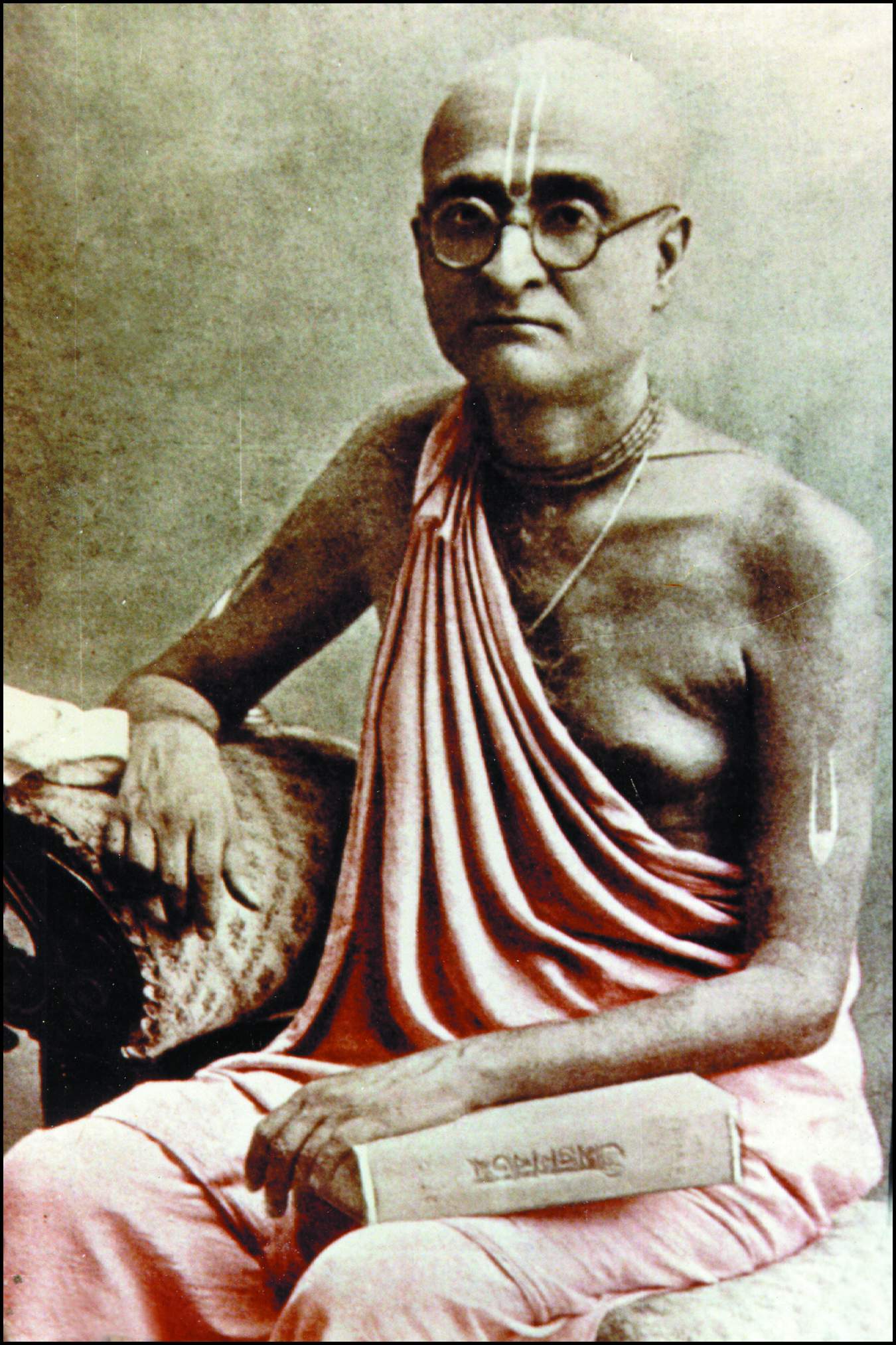 here, all friends, and we express our ideas to each other. In this iṣṭa-goṣṭhī, first, I want to say that after the disappearance of Śrīla Prabhupāda Bhaktisiddhānta Sarasvatī Gosvāmī, many of the senior Vaiṣṇavas, and especially those who were sincere and very beloved to Śrīla Prabhupāda, left his mission. They left that mission but never left their Gurudeva, his teachings, or anything associated with Kṛṣṇa consciousness.
here, all friends, and we express our ideas to each other. In this iṣṭa-goṣṭhī, first, I want to say that after the disappearance of Śrīla Prabhupāda Bhaktisiddhānta Sarasvatī Gosvāmī, many of the senior Vaiṣṇavas, and especially those who were sincere and very beloved to Śrīla Prabhupāda, left his mission. They left that mission but never left their Gurudeva, his teachings, or anything associated with Kṛṣṇa consciousness.
Once, someone told Gurudeva, Śrīla Bhakti Prajñāna Keśava Gosvāmī Mahārāja, “Those who have left the Gauḍīya Mission have left Śrīla Prabhupāda’s teachings.” Gurudeva replied, “We have never left Śrīla Prabhupāda, we will never leave, and we will continue to serve. Let us see what happens in the future.”
The accusers themselves had abandoned Kṛṣṇa consciousness and even left Śrīla Bhaktisiddhānta Sarasvatī Gosvāmī. So, don’t think like that. Let those who are barking continue to bark. Pure disciples never abandon their Gurudeva, relinquish the service of Vaiṣṇavas, and never leave the teachings of their Gurudeva. They never disavow Caitanya Mahāprabhu, Nityānanda Prabhu, and all the Vaiṣṇavas, like Rūpa Gosvāmī, Sanātana Gosvāmī, and Raghunātha dāsa Gosvāmī. They never stop serving the Divine Couple, Śrī Śrī Rādhā-Kṛṣṇa.
They may give up one place and go to another place – they may change their place – but they will always have regard for the place where their Gurudeva has left his footdust.
So you should never think it is a problem if you are in a different place. Take it as the blessings of your 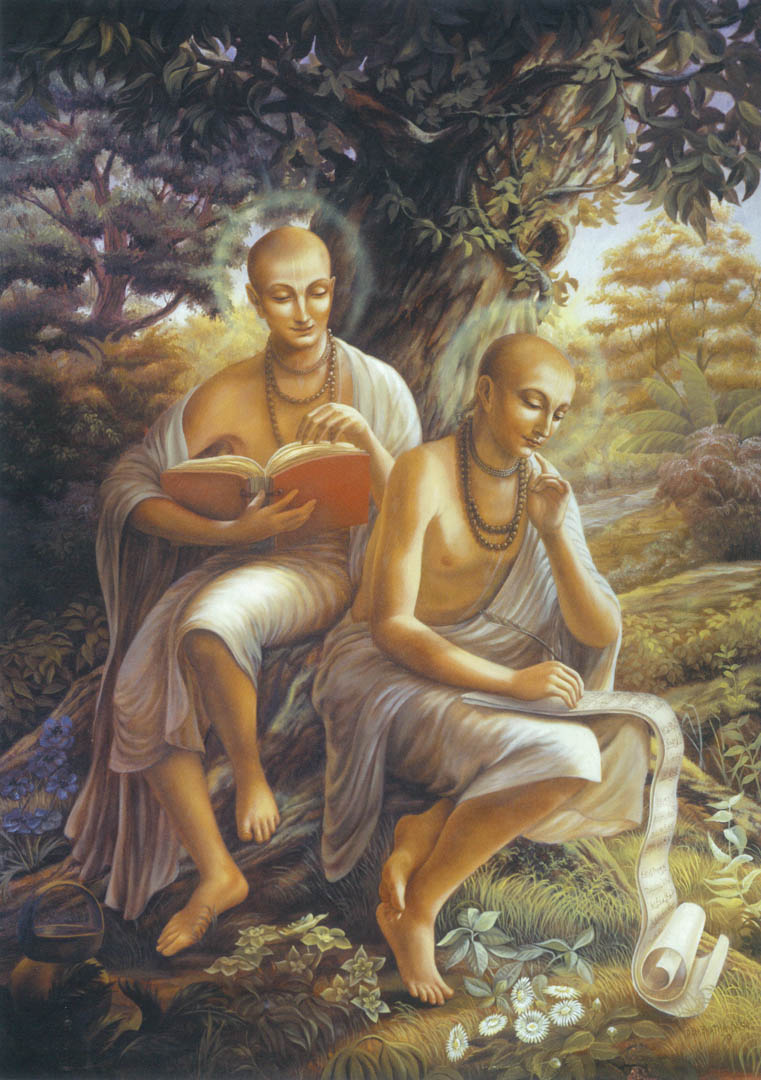 Gurudeva that you are now fully absorbed in chanting and serving him and the Divine Couple Rādhā-Kṛṣṇa, as well as Caitanya Mahāprabhu – Gaura-Nityānanda Prabhu. They are giving this chance. We see that Nārada Ṛṣi and Vyāsadeva were not together all the time, but their hearts were together. Śukadeva Gosvāmī went here and there. We see that Rūpa Gosvāmī, Sanātana Gosvāmī, and Raghunātha dāsa were not always in one place together.
Gurudeva that you are now fully absorbed in chanting and serving him and the Divine Couple Rādhā-Kṛṣṇa, as well as Caitanya Mahāprabhu – Gaura-Nityānanda Prabhu. They are giving this chance. We see that Nārada Ṛṣi and Vyāsadeva were not together all the time, but their hearts were together. Śukadeva Gosvāmī went here and there. We see that Rūpa Gosvāmī, Sanātana Gosvāmī, and Raghunātha dāsa were not always in one place together.
Śrīla Bhaktisiddhānta Prabhupāda saw that Kali-yuga was present, and there was no preaching mission to encourage and engage people in services according to their qualifications in various fields. He wanted to engage all the people in Kṛṣṇa’s service according to their qualifications. So he created a mission during his time.
Then, after the time of Śrīla Bhaktisiddhānta Sarasvatī, many of his followers went here and there, but they maintained their great regard for Caitanya Mahāprabhu’s birthplace and their Gurudeva. And some of those who remained living in their maṭha went to hell. I know them; you may also know who they are.
So you need not think that these are problems. There is only one problem: We do not feel the pangs of separation for Rādhā-Kṛṣṇa, Caitanya Mahāprabhu, and our Gurudeva. This is the only problem. Otherwise, there is no problem at all.
Kṛṣṇa sometimes arranges circumstances like this for the sincere Vaiṣṇavas, though we may think that it is a problem. It is not a problem. Rather, Kṛṣṇa has managed to inspire us to develop our Kṛṣṇa consciousness. We were with all the disciples of Śrīla Bhaktisiddhānta Sarasvatī Gosvāmī Ṭhākura. We are so fortunate to have learned all these truths.
Mahārāja (who spoke before Śrīla Bhaktivedānta Nārāyaṇa Mahārāja) just said something very good. He said that Vaiṣṇavas are more bona fide than śāstra and guru. But this is true in one sense only — not in every case. Kṛṣṇa is Himself the Vedas, Upaniṣads, śāstras, and Śrīmad-Bhāgavatam.
tamādidevaṁ karuṇānidhānaṁ
tamālavarṇaṁ suhitāvatāram
apārasaṁsāra samudra-setuṁ
bhajāmahe bhāgavata-svarūpam
Padma Purāṇa
[I worship the Śrīmad-Bhāgavatam, the auspicious sound incarnation of Śrī Kṛṣṇa, the abode of mercy and the origin of all demigods. His transcendental form is black, like the tamala tree. He has appeared in the beautiful form of this Bhāgavatam to make a bridge whereby materially conditioned souls can cross the otherwise insurmountable ocean of repeated birth and death.]
Vaiṣṇavas cannot be like the Śrīmad-Bhāgavatam. Śrīmad-Bhāgavatam is Kṛṣṇa’s heart. Sometimes there is confusion about who is a Vaiṣṇava and who is not. But śāstra cannot cheat us at any time because He is Kṛṣṇa 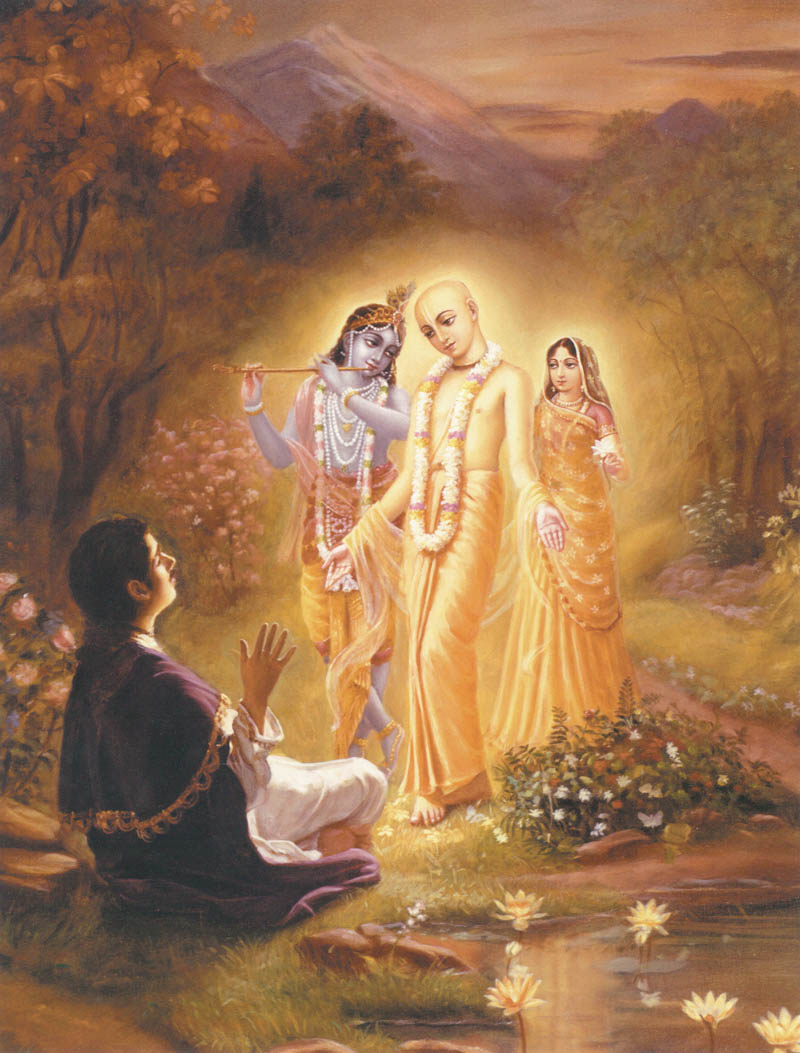 and has emanated from the mouth of Kṛṣṇa or the breathing of Kṛṣṇa. If there are any doubts about the guru or Vaiṣṇavas, we will have to consult śāstra. That is why Caitanya Mahāprabhu told Rāya Rāmānanda, “Whatever you speak, speak with examples from śāstra. Then I will consider that what you speak is bona fide; otherwise, I will dismiss what you say.”
and has emanated from the mouth of Kṛṣṇa or the breathing of Kṛṣṇa. If there are any doubts about the guru or Vaiṣṇavas, we will have to consult śāstra. That is why Caitanya Mahāprabhu told Rāya Rāmānanda, “Whatever you speak, speak with examples from śāstra. Then I will consider that what you speak is bona fide; otherwise, I will dismiss what you say.”
So, what did Rāmānanda Rāya say? For each suggested perfectional goal (sadhya) or process to achieve that goal (sādhana), he quoted a śloka from the Veda, Purāṇa, Upaniṣad, and especially from Gītā and Bhāgavatam – and especially from the Bhāgavatam.
Śrīmad-Bhāgavatam is bona fide at all times, but the key to understanding and realizing it is in the hands of the bhakta-bhāgavata. This is the thing. The pure Vaiṣṇavas have the key. They are bhakta-bhāgavata (the personalities in whose heart Śrīmad-Bhāgavatam is manifest), but Śrīmad-Bhāgavatam is the heart of Kṛṣṇa.
Śrī Caitanya Mahāprabhu used to recite ślokas of Śrīmad-Bhāgavatam, such as:
barhāpīḍaṁ naṭa-vara-vapuḥ karṇayoḥ karṇikāraṁ
bibhrad vāsaḥ kanaka-kapiśaṁ vaijayantīṁ ca mālām
randhrān veṇor adhara-sudhayāpūrayan gopa-vṛndair
vṛndāraṇyaṁ sva-pada-ramaṇaṁ prāviśad gīta-kīrtiḥ
Śrīmad-Bhāgavatam (10.21.5)
[Wearing a peacock-feather ornament upon His head, blue karṇikāra flowers on His ears, a yellow garment as 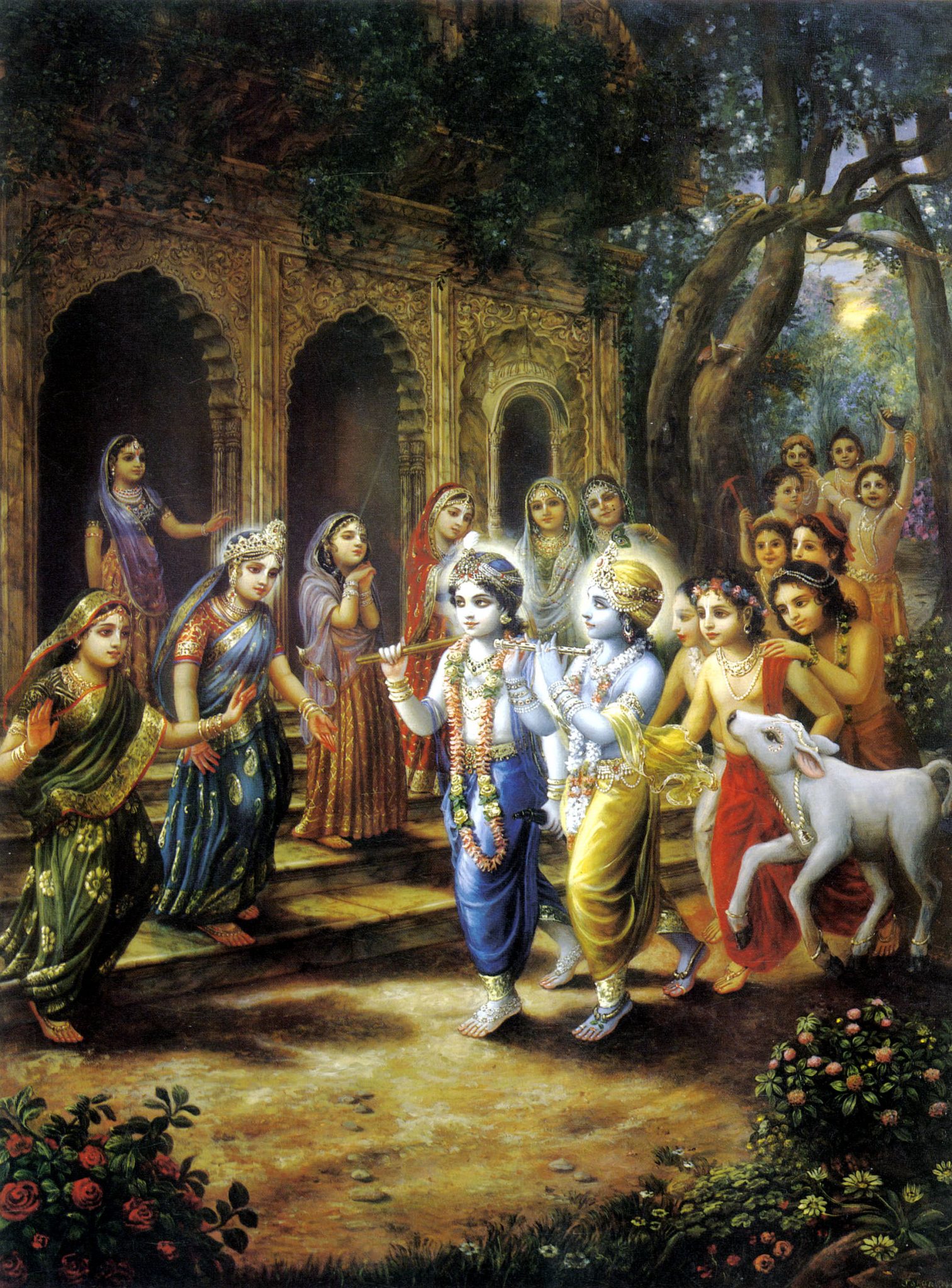 brilliant as gold, and the Vaijayantī garland, Lord Kṛṣṇa exhibited His transcendental form as the greatest of dancers as He entered the forest of Vṛndāvana, beautifying it with the marks of His footprints. He filled the holes of His flute with the nectar of His lips, and the cowherd boys sang His glories.]
brilliant as gold, and the Vaijayantī garland, Lord Kṛṣṇa exhibited His transcendental form as the greatest of dancers as He entered the forest of Vṛndāvana, beautifying it with the marks of His footprints. He filled the holes of His flute with the nectar of His lips, and the cowherd boys sang His glories.]
Śyāmasundara entered the forest of Vṛndā-devī, accompanied by His cowherd boyfriends. His head was decorated with a peacock feather; He wore yellow karṇikāra flowers over His ears and a dazzling golden-yellow garment on His body. A fragrant Vaijayantī garland of five varieties of flowers hung around His neck and extended down to His knees. He was splendidly attired as an expert dancer and appeared just like a very fine actor on stage. He poured the nectar of His lips through the holes of His flute, and the cowherd boys followed behind Him, singing His glories. Śrī Kṛṣṇa made the land of Vṛndāvana even more charming than Vaikuṇṭha, for He beautified it with prints of His lotus feet, which were marked with the conch, disk, and other symbols.
Mahāprabhu would sometimes not be able to recite the entire śloka. He would only start and then become ecstatic and call out, “Rādhe Rādhe! Kṛṣṇa Kṛṣṇa Kṛṣṇa!” Then Gadādhara Prabhu would come and help Him.
There are so many ślokas, such as:
aho bakī yaṁ stana-kāla-kūṭaṁ
jighāṁsayāpāyayad apy asādhvī
lebhe gatiṁ dhātry-ucitāṁ tato ’nyaṁ
kaṁ vā dayāluṁ śaraṇaṁ vrajema
Śrīmad-Bhāgavatam (3.2.23)
[Alas, how shall I take shelter of one more merciful than He who granted the position of mother to a she-demon (Pūtanā) although she was unfaithful and she prepared deadly poison to be sucked from her breast?]
How astonishing! When Pūtanā, the wicked sister of Bakāsura, tried to kill child Kṛṣṇa by offering Him deadly poison on her breast, He gave her the position of His nursemaid. Could I ever have as merciful a shelter as that of Lord Kṛṣṇa?
Śāstra has no bhrama (tendency to commit mistakes), pramāda (tendency to be illusioned), vipralipsā (cheating propensity), or karaṇāpāṭava (imperfect senses), but a sādhu may do all these things. From the kaniṣṭha-adhikārī to uttama mahā-bhāgavatas like Śukadeva Gosvāmī and Nārada Gosvāmī, all are Vaiṣṇavas, but we will have to recognize who is who. How? If they are following Śrīmad-Bhāgavatam, then they are true sādhu and guru, otherwise not. By following śāstra, they have become sādhus. Otherwise, they are not sādhus, not Vaiṣṇavas – not actual Vaiṣṇavas.
sūta uvāca
ātmārāmāś ca munayo
nirgranthā apy urukrame
kurvanty ahaitukīṁ bhaktim
ittham-bhūta-guṇo hariḥ
Śrīmad-Bhāgavatam (1.7.10)
[Sūta Gosvāmī said: All different varieties of ātmārāmas (those who take pleasure in the ātmā, or spirit self), especially those established on the path of self-realization, though freed from all kinds of material bondage, desire to render unalloyed devotional service unto the Personality of Godhead. This means that the Lord possesses transcendental qualities and therefore can attract everyone, including liberated souls.]
At first, Śukadeva Gosvāmī was a brahma–jñānī and went to the jungle. But later, when he returned and heard the entire Śrīmad-Bhāgavatam, he became a rasika Vaiṣṇava. And then it is said:
nigama-kalpa-taror galitaṁ phalaṁ
śuka-mukhād amṛta-drava-saṁyutam
pibata bhāgavataṁ rasam ālayam
muhur aho rasikā bhuvi bhāvukāḥ
Śrīmad-Bhāgavatam (1.1.3)
[O expert and thoughtful men relish Śrīmad-Bhāgavatam, the mature fruit of the desire tree of Vedic literature. It emanated from the lips of Śrī Śukadeva Gosvāmī. Therefore this fruit has become even more tasteful, although its nectarean juice was already relishable for all, including liberated souls.]
What is that Bhāgavatam? It is rasam ālayam (the endless ocean of rasa). If a person does not follow the Śrīmad-Bhāgavatam, he is not a sādhu.
ārādhyo bhagavān vrajeśa-tanayas tad-dhāma vṛṇdāvanaṁ
ramyā kācid upāsanā vraja-vadhū-vargeṇā yā kalpitā
śrīmad-bhāgavataṁ pramāṇam amalaṁ premā pum-artho mahān
śrī-caitanya-mahāprabhor matam idaṁ tatrādaro naḥ paraḥ
Caitanya-mañjuṣā
[Bhagavān Vrajendra-nandana Śrī Kṛṣṇa is our only worshipful object. In the same way that He is worshipful, so is His transcendental abode, Śrī Vṛndāvana Dhāma. The mood in which the young brides of Vraja have worshipped Him is the highest perfectional form of love of God. Śrīmad Bhāgavatam alone is the immaculate śabda-pramāṇa (scriptural evidence), and prema is the supreme objective of life. This is the teachings of Śrī Caitanya Mahāprabhu. We hold this conclusion (siddhānta) in supreme regard and have no inclination or respect for any other conclusion.]
The spotless authority is Śrīmad-Bhāgavatam, and Mahāprabhu himself accepts this. If a person is not 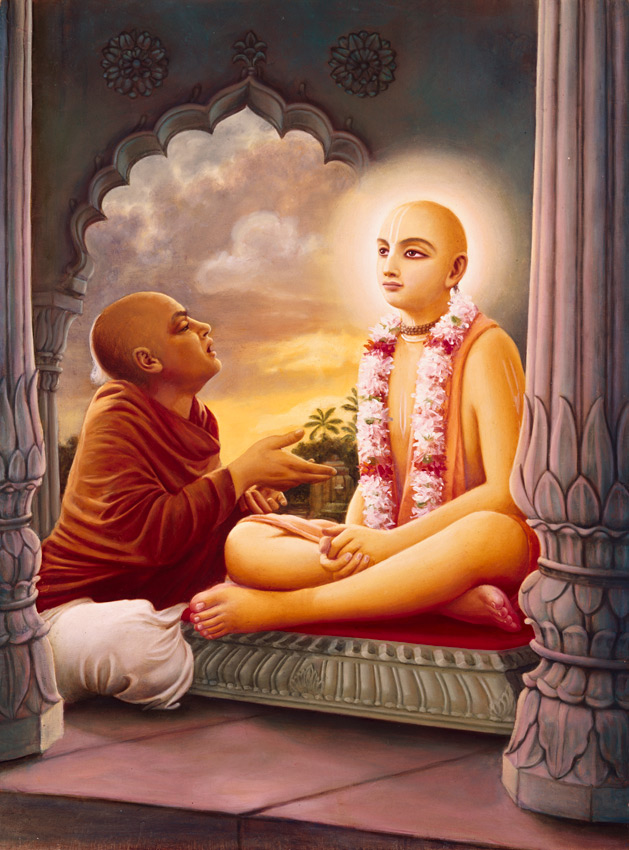 following the Śrīmad-Bhāgavatam, although he may be considered a great philosopher and famous as a great bhakta, we still don’t recognize him as an authority. On the other hand, we recognize one as an authority if he is absorbed in the Śrīmad-Bhāgavatam and knows the meaning of Śrī Caitanya Mahāprabhu’s instructions to Sārvabhauma Bhaṭṭācārya. Sārvabhauma Bhaṭṭācārya presented nine explanations of the [following] verse:
following the Śrīmad-Bhāgavatam, although he may be considered a great philosopher and famous as a great bhakta, we still don’t recognize him as an authority. On the other hand, we recognize one as an authority if he is absorbed in the Śrīmad-Bhāgavatam and knows the meaning of Śrī Caitanya Mahāprabhu’s instructions to Sārvabhauma Bhaṭṭācārya. Sārvabhauma Bhaṭṭācārya presented nine explanations of the [following] verse:
ātmārāmāś ca munayo
nirgranthā apy urukrame
kurvanty ahaitukīṁ bhaktim
ittham-bhūta-guṇo hariḥ
Śrīmad-Bhāgavatam (1.7.10)
[Those who are self-satisfied and unattracted by external material desires are also attracted to the loving service of Śrī Kṛṣṇa, whose qualities are transcendental and whose activities are wonderful. Hari, the Personality of Godhead, is called Kṛṣṇa because He has such transcendentally attractive features.]
Caitanya Mahāprabhu presented sixty-four explanations of the same verse. Hearing Mahāprabhu’s explanations, Sārvabhauma Bhaṭṭācārya fell flat, offering his prostrated obeisances at the Lord’s lotus feet.
Mahāprabhu then said:
āstīrya darbhaiḥ prāg-agraiḥ
kārtsnyena kṣiti-maṇḍalam
stabdho bṛhad-vadhān mānī
karma nāvaiṣi yat param
tat karma hari-toṣaṁ yat
sā vidyā tan-matir yayā
[My dear King, the entire world is covered with the sharp points of kuśa grass, and on the strength of this you have become proud because you have killed various types of animals in sacrifices. Because of your foolishness, you do not know that devotional service is the only way one can please the Supreme Personality of Godhead. You cannot understand this fact. Your only activities should be those that can please the Personality of Godhead. Our education should be such that we can become elevated to Kṛṣṇa consciousness.]
Śrīmad-Bhāgavatam (4.29.49)
Sā vidyā tan-matir yayā – Our education should be such that we can become elevated to Kṛṣṇa consciousness.
paḍe kene loka? — kṛṣṇa bhakti jāni
bāre
se yadi nahila, tabe vidyāya ki kare?
viṣaya-madāndha saba kichui nā jāne
vidyā-made, dhana-made vaiṣṇava nā cine
bhāgavata paḍiyāo kā ‘ro buddhi nāśa
Caitanya-bhāgavata (Ādi-khaṇḍa 12.49 and Madhya-khaṇḍa 9.241-242)
“Why do people study? Education is only for understanding the devotional service of Lord Kṛṣṇa. If that purpose is not served, then what is the use of Your education? Everyone is blinded by pride and sense gratification. They are proud of their education and wealth but fail to recognize a Vaiṣṇava. If one studies Śrīmad Bhāgavatam improperly, his intelligence is polluted.”
Bhāgavatam is the limit of education. If one understands Bhāgavatam, he’s completed his education.
Vaiṣṇavas have indeed said that Kṛṣṇa and Yogamāyā both came from the womb of Yaśodā. But you should 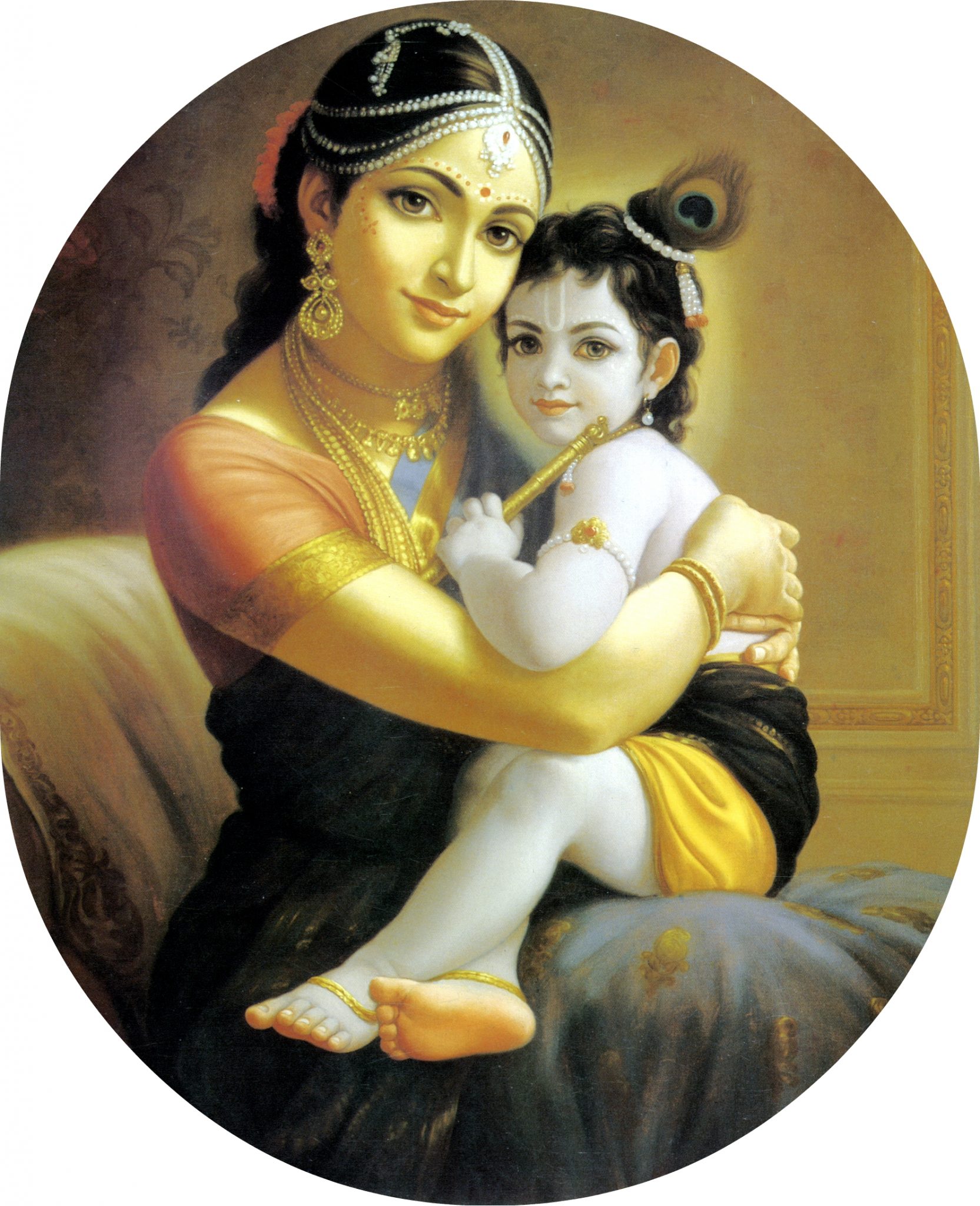 know that not only are these the words of Vaiṣṇavas, but this is stated in the Śrīmad-Bhāgavatam and also in the Hari–vaṁśa Purāṇa, written by Śrīla Vyāsa – that Kṛṣṇa came from the womb of Yaśodā. It has been written there. It is not only that Viśvanātha Cakravartī Ṭhākura and Śrīla Sanātana Gosvāmī and Śrīla Jīva Gosvāmī have explained this. Rather, their explanations are based on the authority of bona fide śāstra. Jīva Gosvāmī has presented all these topics in the first Sandarbha – Tattva-sandarbha – and Śrīla Baladeva Vidyābhūṣaṇa has presented these topics in his Siddhānta-darpaṇa. We should know and honour all these truths.
know that not only are these the words of Vaiṣṇavas, but this is stated in the Śrīmad-Bhāgavatam and also in the Hari–vaṁśa Purāṇa, written by Śrīla Vyāsa – that Kṛṣṇa came from the womb of Yaśodā. It has been written there. It is not only that Viśvanātha Cakravartī Ṭhākura and Śrīla Sanātana Gosvāmī and Śrīla Jīva Gosvāmī have explained this. Rather, their explanations are based on the authority of bona fide śāstra. Jīva Gosvāmī has presented all these topics in the first Sandarbha – Tattva-sandarbha – and Śrīla Baladeva Vidyābhūṣaṇa has presented these topics in his Siddhānta-darpaṇa. We should know and honour all these truths.
At the same time, without bhakta–bhāgavata (the bona fide guru and Vaiṣṇavas), we cannot know the Śrīmad-Bhāgavatam; the key is in their hands. We should always honour them, not less than Kṛṣṇa, but more than Kṛṣṇa. We first do arcana of Gurudeva and then Rādhā-Kṛṣṇa:
yasya deve parā bhaktir
yathā deve tathā gurau
tasyaite kathitā hy arthāḥ
prakāśante mahātmanaḥ
Śvetāśvatara Upaniṣad (6.23)
[“Only unto those great souls who have implicit faith in both the Lord and the spiritual master are all the imports of the Vedic knowledge automatically revealed.”]
All the hidden meanings of the Śrutis are revealed only in the heart of that great soul who has the highest transcendental devotion towards Śrī Bhagavān and also His representative, śrī gurudeva.
The guru should be honoured more than Kṛṣṇa Himself because the guru has taken us to the lotus feet of Kṛṣṇa. He has given us the relationship with Kṛṣṇa; otherwise, we could not have it. First, worship Gurudeva, and then the Deities. Also, in aṣṭa-kālīya-līlā, first Gurudeva, then Caitanya Mahāprabhu, and then come to Kṛṣṇa and Rādhā. This is the process.
We are indebted to the Vaiṣṇavas because they have taken us to gurudeva. Otherwise, we could not have realized who is a guru and who is not a guru. We are indeed indebted to the Vaiṣṇavas, and gurudeva is also a Vaiṣṇava. If a gurudeva does not honour Vaiṣṇavas, he is not a bona fide guru — he should not be accepted as a guru.
Sometimes, a dīkṣā-guru is superior; sometimes, a śikṣā-guru is superior. For example, we treat and understand Rūpa Gosvāmī as our śikṣā-guru. Kṛṣṇa is śikṣā-guru, Lalitā is śikṣā-guru, Viśākhā is śikṣā-guru, Svarūpa Dāmodara and Rāya Rāmānanda are śikṣā-gurus. They are not inferior to our gurudeva. They – Rūpa Gosvāmī, Svarūpa Dāmodara, Rāya Rāmānanda – are worshipable for our gurudeva also.
Still, they are śikṣā-gurus for us; we should not consider who is inferior or superior among them. Truly, Kṛṣṇa is our gurudeva or Caitanya Mahāprabhu, and He inspires us. He is caitya-guru. He is not inferior to our dīkṣā-guru.
Certainly, we are indebted to all Vaiṣṇavas because they have given us all these truths. We should honour Vaiṣṇavas, Gurudeva, śikṣā-guru, dīkṣā-guru, Śrī Caitanya Mahāprabhu, Nityānanda Prabhu, all His associates, and also Rādhā and Kṛṣṇa with all Their associates.
I wanted to speak about sadhya and sādhana and the sum and substance of all the teachings of Śrīla Rūpa Gosvāmī. I wanted to explain something, but time is over. I’ll speak very briefly.
Devotee: More time is available.
Śrīla Bhaktivedānta Nārāyaṇa Mahārāja:
tan-nāma-rūpa-caritādi-sukīrtanānu-
smṛtyoḥ krameṇa rasanā-manasī niyojya
tiṣṭhan vraje tad-anurāgi-janānugāmī
kālaṁ nayed akhilam ity upadeśa-sāram
Śrī Upadeśāmṛta (8)
[The essence of all advice is that one should utilize one’s full time – twenty-four hours a day – in nicely chanting and remembering the Lord’s divine name, transcendental form, qualities and eternal pastimes, thereby gradually engaging one’s tongue and mind. In this way one should reside in Vraja (Goloka Vṛndāvana-dhāma) and serve Kṛṣṇa under the guidance of devotees. One should follow in the footsteps of the Lord’s beloved devotees, who are deeply attached to His devotional service.]
While living in Vraja as a follower of those who are attached to Śrī Kṛṣṇa, one should utilize all his time by gradually transferring the absorption of his tongue and mind from matters other than Kṛṣṇa to the chanting and remembering of narrations of Śrī Kṛṣṇa’s name, form, qualities, and pastimes. This is the essence of all instruction.
Rūpa Gosvāmī says… I will briefly explain because there is no time. Rūpa Gosvāmī says, “I am giving only one teaching. This is the sum and substance of all the teachings — Upadeśāmṛta.” But, I want to explain one śloka before this śloka, which is more important for us. Then we can clearly understand the meaning of the śloka: tan-nāma-rūpa-caritādi. This śloka is:
gurau goṣṭhe goṣṭhālayiṣu sujane bhūsura-gaṇe
sva-mantre śrī-nāmni vraja-nava-yuva-dvandva-śaraṇe
sadā dambhaṁ hitvā kuru ratim apūrvam atitarām
aye svāntar bhrātaś caṭubhir abhiyāce dhṛta-padaḥ
Śrī Manaḥ-śikṣā (1)
[“O my dear brother; my foolish mind! Taking hold of your feet, I humbly pray to you with sweet words. Please give up all pride and quickly develop sublime and incessant rati for śrī gurudeva, Śrī Vraja-dhāma, the residents of Vraja, the Vaiṣṇavas, the brāhmaṇas, my dīkṣā-mantras, the holy names of the Supreme Lord, and the shelter of Śrī Śrī Rādhā-Kṛṣṇa, the eternally youthful divine couple of Vraja.”]
The disciple of Śrīla Rūpa Gosvāmī, the actual, sincere follower of Rūpa Gosvāmī, a rūpānuga Vaiṣṇava — 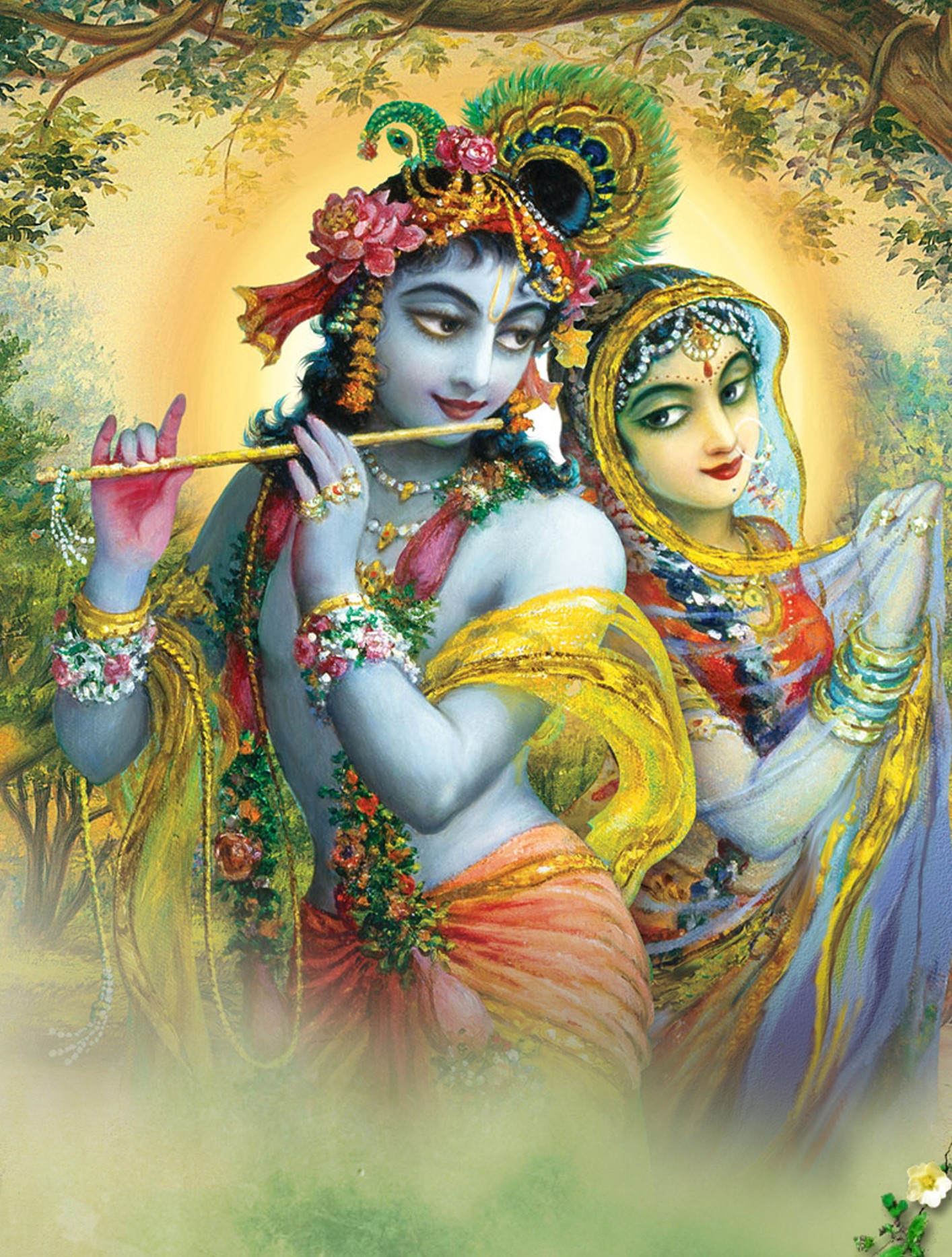 Raghunātha dāsa Gosvāmī — is training his mind and praying to his mind.
Raghunātha dāsa Gosvāmī — is training his mind and praying to his mind.
He instructs his mind, “Don’t be so foolish. Don’t be diverted. I’m giving you some instructions for your benefit. Oh, you are so dear, my dear mind: gurau goṣṭhe goṣṭhālayiṣu sujane bhūsura-gaṇe. If you want to realize your true self and if you want to serve the Divine Couple Śrī Śrī Rādhā-Kṛṣṇa in Vṛndāvana forever with rati – rati means bhāva – with bhāva, then you have to follow some rules and regulations that I have accepted from Rūpa Gosvāmī. And these are, you should serve with your entire heart, rejecting all the unfavourable things and accepting all the favourable things for the loving attachment to Kṛṣṇa.”
First guru: you should serve your gurudeva with viśrambha–bhāva:
guru-pādāśrayas tasmāt
kṛṣṇa-dīkṣādi-śikṣaṇam
viśrambheṇa guroḥ sevā
sādhu-vartmānuvartanam
sad-dharma-pṛcchā bhogādi-
tyāgaḥ kṛṣṇasya hetave
Bhakti-rasāmṛta-sindhu (1.2.74-75)
Don’t think that Gurudeva stays far away from us. Don’t think, “I am so inferior. I should offer respect from a distance; otherwise, I will commit offences. If I follow him, his dust will come on my feet, which will be very offensive. Dust is in the room where he is always moving here and there, I should not enter that place. And if I sweep the room, I am taking his foot dust and throwing it out, this is very offensive. What to do? I should stay very far away from that guru.”
No. Foolish people and kaniṣṭha-adhikārīs may think like this. We should see him as very dear. There is none in this whole world as dear as him. He nourishes us with no expectation of remuneration. He [selflessly] helps us. He is my father and mother; he is everything to me.
A boy climbs onto the lap of his mother. He does like this, sometimes like this, sometimes doing so many silly things, with his feet, like this, but the mother does not take any offence; rather, she becomes so happy – so happy, “Oh, my boy is becoming strong now!” (Śrīla Bhaktivedānta Nārāyaṇa Mahārāja laughs) “And he will be so healthy by doing so.” And she kisses the boy.
So, we should not fear our Gurudeva. He is near and dear – there is no one dearer to us. Viśrambheṇa. What is the meaning of viśrambheṇa? What is the meaning of viśrambha?
Devotee: Friendly, without reverence.
Śrīla Bhaktivedānta Nārāyaṇa Mahārāja: Yes.
Devotees: Intimate.
Śrīla Bhaktivedānta Nārāyaṇa Mahārāja: Intimate, but don’t fear [him]. There should not be a wall of reverence there. We should know his moods and what he wants, not that, “He will order, and then I will carry out.” No. This is not his mood, not his internal mood. The best servant of Gurudeva is one who thinks, “What does my Gurudeva want?” Does he want me to always cook and wash his clothes, or does he want his Prabhu’s glories, Rādhā-Kṛṣṇa’s glories, Mahāprabhu’s glories, to be preached in all parts of the world? What does he want? If a disciple does not think like this, then he is a kaniṣṭha-adhikārī.
We should try to follow. Gurau goṣṭhe. What is goṣṭha? Gokula is goṣṭha, Kṛṣṇa and all His associates, 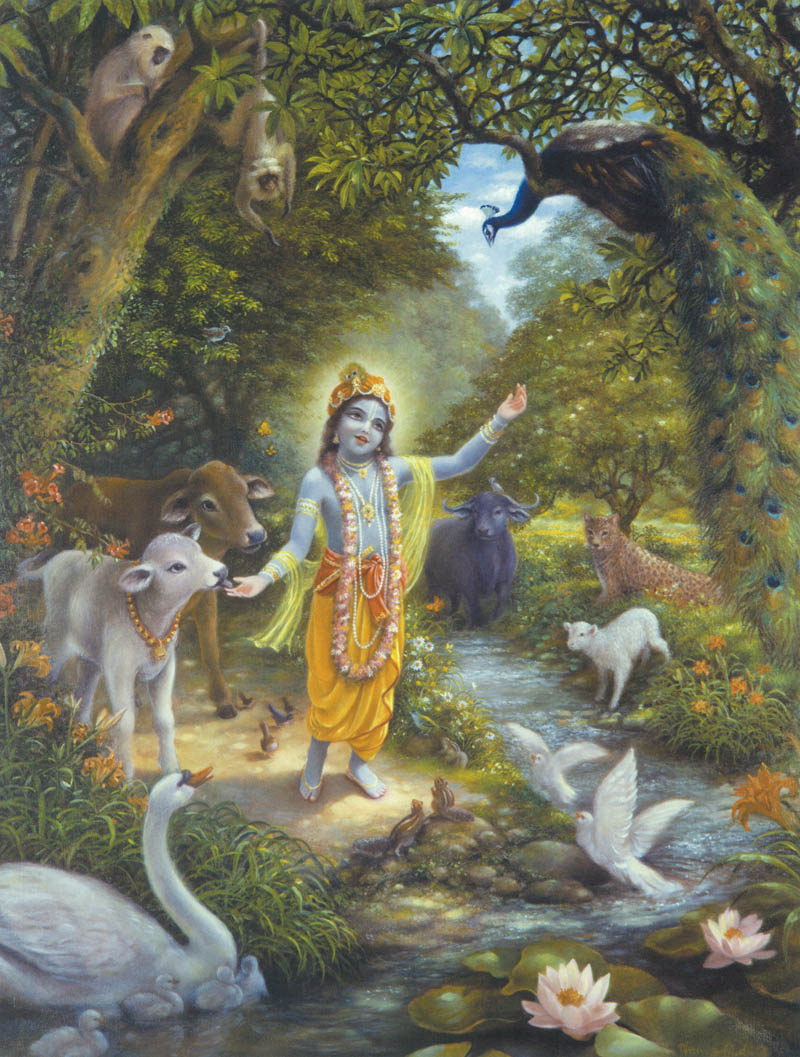 cows, gopīs, gopa, govatsa; everyone is there – that is goṣṭha. Also, sometimes this goṣṭha goes to Vṛndāvana from Gokula Mahāvana. Gokula is everywhere. When it is in Mahāvana, then it is called Gokula Mahāvana. Mahāvana Gokula. When it goes to Vṛndāvana, then it is called Vṛndāvana Gokula. When it goes to Rādhā-kuṇḍa, then it is called Rādhā-kuṇḍa Gokula. When it goes to Nandagaon, it is called Nandagaon Gokula. A goṣṭha is where Nanda, Yaśodā, Śrīdāma, Subala and all the cows, calves – especially Mother Yaśodā and Nanda Bābā, and more especially all the gopīs like Lalitā, Viśākhā, Citrā, and Śrīmatī Rādhikā – are serving Kṛṣṇa in so many ways; and Kṛṣṇa is also serving Śrīmatī Rādhikā. This is called goṣṭha. You should always serve this goṣṭha, “Oh [my dear] mind, always think about this and try to serve them.”
cows, gopīs, gopa, govatsa; everyone is there – that is goṣṭha. Also, sometimes this goṣṭha goes to Vṛndāvana from Gokula Mahāvana. Gokula is everywhere. When it is in Mahāvana, then it is called Gokula Mahāvana. Mahāvana Gokula. When it goes to Vṛndāvana, then it is called Vṛndāvana Gokula. When it goes to Rādhā-kuṇḍa, then it is called Rādhā-kuṇḍa Gokula. When it goes to Nandagaon, it is called Nandagaon Gokula. A goṣṭha is where Nanda, Yaśodā, Śrīdāma, Subala and all the cows, calves – especially Mother Yaśodā and Nanda Bābā, and more especially all the gopīs like Lalitā, Viśākhā, Citrā, and Śrīmatī Rādhikā – are serving Kṛṣṇa in so many ways; and Kṛṣṇa is also serving Śrīmatī Rādhikā. This is called goṣṭha. You should always serve this goṣṭha, “Oh [my dear] mind, always think about this and try to serve them.”
There are two kinds of guru – śikṣā-guru and dīkṣā-guru – and they should be worshipped in the same way. Gurau goṣṭhe goṣṭhālayiṣu – those who are living in all goṣṭhas. Who? Who are they? They are Rūpa, Sanātana, Raghunātha and those like them living in Vṛndāvana and serving Kṛṣṇa in any of the three ways, like Subala and Śrīdāma, like Yaśodā Maiyā and Nanda Bābā, and like the gopīs. They are goṣṭhālayiṣu. Rūpa Gosvāmī and Sanātana Gosvāmī, they are serving Kṛṣṇa and Rādhā in the mood of Rūpa Mañjarī and Lavaṅga Mañjarī day and night. We should think, “Oh, [my dear] mind, try to serve them.”
Also, try to serve sujane: they are those who are not in the line of Gauḍīya Vaiṣṇavas. They don’t follow Caitanya Mahāprabhu, and they don’t think that “Kṛṣṇa is my sakhā; Kṛṣṇa is my son; or Kṛṣṇa is my beloved like the gopīs.” But anyhow, being in Vṛndāvana, they are serving Nārāyaṇa or Rāma. But actually, they are not in Vṛndāvana. They are in Vṛndāvana, but they are living in Vaikuṇṭha or Ayodhyā or Dvārakā-purī, yet they are sujana. They may be from other sampradāyas, but they should also be respected. Don’t dishonour them.
And bhūsura-gaṇe: bhūsura means the brāhmaṇas of Vṛndāvana, Vraja, and Navadvīpa. Although they are not ananya-bhaktas (one-pointed devotees) of Kṛṣṇa and worship the demigods and desire money, they always chant or hear “Rādhe Rādhe, Jaya Jaya Śrī Rādhe Rādhe.” In the night, all the watchmen of Vṛndāvana also shout, “Rādhe Rādhe! Rādhe Rādhe!”
The cuckoos and all the other birds sing, “Rādhe Rādhe!”
Along with her flow, the Yamunā shouts, “Rādhe Rādhe!” All the trees shout, “Rādhe Rādhe!” and echo, “Rādhe Rādhe!” All the grasses have the dust of the gopīs. Still, their Vṛndāvana is Vṛndāvana, even though they do not realize all these things, but they honour Kṛṣṇa. They should also be honoured according to their qualifications. Not like goṣṭhālayiṣu or goṣṭha, but they should be honoured as much as they are qualified.
Sva-mantre: Gurudeva has given mantras: brahma-gāyatrī, kāma-gāyatrī, gopāla-mantra, gaura-gāyatrī, gaura-mantra. You should try to chant all these mantras attentively and not be distracted. While doing japa, you inquire, “Oh, where are you going?” and start chanting again. And if you have to take care of some business, you think, “Oh, I will chant the mantras afterwards.” Not like this; rather, you should be patient and calm, meditate, and pray to the mantra.
You should think, “You are Kṛṣṇa Himself.” The Caitanya Mahāprabhu mantra or the gaura-mantra is Caitanya Mahāprabhu Himself. The gopāla-mantra is Madana-mohana, Kṛṣṇa, Govinda, Gopīnātha, and Gopī-jana-vallabha. He should manifest as He is. In kāma-gāyatrī… kāma-gāyatrī is the embodiment of all the senses of Kṛṣṇa Himself. The twenty-four-and-a-half syllables embody all the parts of Kṛṣṇa’s body. Kṛṣṇa Himself is this mantra. It is described in Caitanya-caritāmṛta that we should always be in Vṛndāvana by chanting the kāma-gāyatrī-mantra – doing ārādhana of Kṛṣṇa. It is a very powerful mantra – the kāma-gāyatrī and gopāla-mantra can give the service of Kṛṣṇa in Vṛndāvana. So, patiently and attentively, you should chant all these mantras with your heart. Everything is contained in the mantra. You will realize this. Don’t be neglectful or in a hurry.
One may think, “Our Gurudeva has said, ‘Only book distribution will do everything.”‘ Someone told me in Los 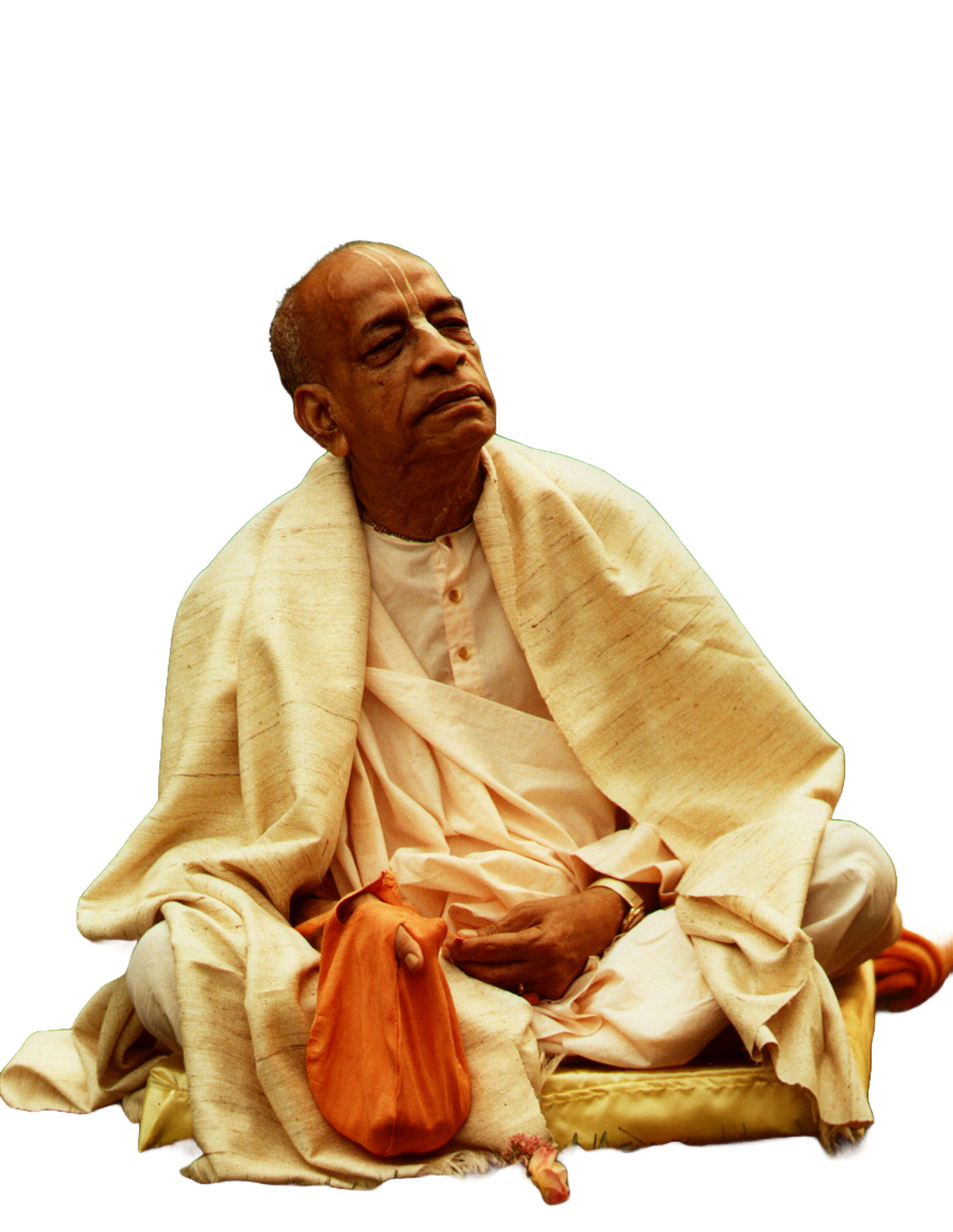 Angeles that Svāmījī has done everything; he has given us everything; we don’t need to go to anyone else, we don’t need to hear anyone else, we don’t need to read anything else. I told him, “You are quite wrong. The foolish speak like this.” If everything was in Śrīmad-Bhāgavatam, then why did Śrīla Rūpa Gosvāmī write Bhakti-rasāmṛta-sindhu, Ujjvala-nīlamaṇi, and all the other books? Why did Kṛṣṇadāsa Kavirāja Gosvāmī write Caitanya-caritāmṛta? I know that if Kṛṣṇa were to write and if Baladeva were to write, even then, some remnants would remain. I know that Svāmījī has written many books. But he has only translated the tenth canto – Rāsa-pañcādhyāyī – and after that? He has not done the remaining [cantos]. He surely would have done it if he was in this world. Then where has he given all these things? I know he could not sit idle; he has written many books. Many good people will come in the future – realized devotees may appear.
Angeles that Svāmījī has done everything; he has given us everything; we don’t need to go to anyone else, we don’t need to hear anyone else, we don’t need to read anything else. I told him, “You are quite wrong. The foolish speak like this.” If everything was in Śrīmad-Bhāgavatam, then why did Śrīla Rūpa Gosvāmī write Bhakti-rasāmṛta-sindhu, Ujjvala-nīlamaṇi, and all the other books? Why did Kṛṣṇadāsa Kavirāja Gosvāmī write Caitanya-caritāmṛta? I know that if Kṛṣṇa were to write and if Baladeva were to write, even then, some remnants would remain. I know that Svāmījī has written many books. But he has only translated the tenth canto – Rāsa-pañcādhyāyī – and after that? He has not done the remaining [cantos]. He surely would have done it if he was in this world. Then where has he given all these things? I know he could not sit idle; he has written many books. Many good people will come in the future – realized devotees may appear.
And according to time, the same wine in a new bottle will be presented, i.e. more books will be available. We only see the bottle and not the same wine. This is the reason for quarrelling. So Svāmījī has not given us anything new. He has given us the same wine that was in the Śrīmad-Bhāgavatam bottle. Śukadeva Gosvāmī says that he has not given everything. I know that Caitanya-caritāmṛta has explained the Śrīmad-Bhāgavatam. If Caitanya-caritāmṛta was not there, then we could not have understood the Śrīmad-Bhāgavatam in the real sense. I know that Kṛṣṇa can come and like Vyāsa, He can write all these things: so many Upaniṣads, Vedas, and Śrīmad-Bhāgavatam. He has done all these things. Even for the time being, everything is necessary.
Śrīla Sanātana Gosvāmī has said, and also Viśvanātha Cakravartī has said, “I am taking the remnants of Śrīla Śrīdhara Svāmī,” And Viśvanātha Cakravartī Ṭhākura says, “I am taking the remnants of the remnants of the remnants of Śrīla Sanātana Gosvāmī and Jīva Gosvāmī – what they have left I am presenting.”
In Caitanya-caritāmṛta, Kṛṣṇadāsa Kavirāja Gosvāmī has written that “Vyāsa has done everything. The Caitanya-līlā Vyāsa – Vṛndāvana dāsa Ṭhākura has done everything, but yet he has left some remnants for me to take.”
So, saying, “He has given us everything is incorrect.” Yes, I admit that he has given everything but kept it in a box. You were maybe a little orphan boy who could not use all these things then. He has kept it reserved so that you will understand everything is in this treasure box once you have matured.
In a sense, he certainly has given us all the things, but you will have to study. We cannot study all these books in universities or anywhere else. We must go to the Vaiṣṇavas — [bhakta-] bhāgavata. And after that, you will have so much affection.
“Oh [my dear] mind, then come to Śrī Caitanya Mahāprabhu and His parikaras (associates). Develop deep loving attachment to the Divine Couple.” So, we should try to follow all these things. We will not gain anything if we do not follow all these things.
After this śloka comes the next śloka:
tan-nāma-rūpa-caritādi-sukīrtanānu-
smṛtyoḥ krameṇa rasanā-manasī niyojya
tiṣṭhan vraje tad-anurāgi-janānugāmī
kālaṁ nayed akhilam ity upadeśa-sāram
Śrī Upadeśāmṛta (8)
[The essence of all advice is that one should utilize one’s full time – twenty-four hours a day – in nicely chanting and remembering the Lord’s divine name, transcendental form, qualities and eternal pastimes, thereby gradually engaging one’s tongue and mind. In this way one should reside in Vraja (Goloka Vṛndāvana-dhāma) and serve Kṛṣṇa under the guidance of devotees. One should follow in the footsteps of the Lord’s beloved devotees, who are deeply attached to His devotional service.]
Always being in Vṛndāvana remembering…what? Staying under the guidance of Vaiṣṇavas like Rūpa-Sanātana, we are always remembering. Under their guidance, be in Vṛndāvana and always chant; do kīrtana of the holy names. Which names? The prominent names:
agha-damana-yaśodā-nandanau! nanda-sūno!
kamala-nayana-gopī-candra-vṛndāvanendrāḥ!
praṇata-karuṇa-kṛṣṇāv ity aneka-svarūpe
tvayi mama ratir uccair vardhatāṁ nāmadheya!
Śrī Kṛṣṇa-nāmāṣṭaka (5)
O Nāma, may my love for You in Your many forms — such as Aghadamana (He who overpowered Agha), Yaśodā-nandana (the son of Yaśodā), Nanda-sūno (the son of Nanda), Kamala-nayana (lotus-eyed one), Gopīcandra (the moon of the gopīs), Vṛndāvanendra (the Lord of Vṛndāvana], and Praṇata-karuṇa (one who is compassionate to those who are surrendered) — always increase.
Rādhā-ramaṇa – Nārada is singing on his vīṇā – Rādhā-ramaṇa.
nārada muni, bājāya vīṇā, ‘rādhikā-ramaṇa’ name
nāma amani, udita hoya, bhakata-gīta-sāme
Nārada Muni (1)
[The supremely rasika Nārada Muni plays his vīṇā, singing the names of Śrī Rādhikā-Ramaṇa. Hearing this kīrtana, Śrī Rādhā and Śrī Rādhikā-Ramaṇa Themselves immediately descend, dancing and tasting the bhāva of Their devotees.]
nārada-vīṇojjīvana! sudhormi-niryāsa-mādhurī-pūra!
tvaṁ kṛṣṇ a-nāma! kāmaṁ sphura me rasane rasena sadā
Śrī Kṛṣṇa-nāmāṣṭaka (8)
O life of Nārada’s vīṇā, O You who are like waves of essential nectar in the ocean of sweetness! O Kṛṣṇa-nāma! Of Your own volition, please always manifest on my tongue.
Rasane – what should manifest on our tongue? Kṛṣṇa’s name, Rādhā-ramaṇa’s name, Rādhā-Govindanātha, Rasabihārī’s name, Rādhā-Madana-mohana, you should chant all these names with pure devotion and love; chant these names with rasa.
Now what is the time? About nine.
Devotee: It is a quarter after nine.
Śrīla Bhaktivedānta Nārāyaṇa Mahārāja: What is Kṛṣṇa doing, where is Kṛṣṇa going? Kṛṣṇa has been  decorated, and He has a stick in His hand. Lakhs and lakhs of cows are going. Kṛṣṇa, with lakhs and lakhs of friends, is going from one forest to another, Vṛndāvana to Kāmyavana. Sometimes He goes to Bhāṇḍīravana, sometimes to Madhuvana, Tālavana, Kumudavana, or Bahulāvana. All His friends are following Him and singing, “O Kṛṣṇa, Kṛṣṇa !” Like this, “Kanhaiyā, Kanhaiyā! Bhaiyā Kanhaiyā!” Do you know the meaning of Bhaiyā Kanhaiyā? It is a very affectionate name – Kanhaiyā. Sometimes they are quarrelling, sometimes they are laughing and loving each other, and they are going along merrily.
decorated, and He has a stick in His hand. Lakhs and lakhs of cows are going. Kṛṣṇa, with lakhs and lakhs of friends, is going from one forest to another, Vṛndāvana to Kāmyavana. Sometimes He goes to Bhāṇḍīravana, sometimes to Madhuvana, Tālavana, Kumudavana, or Bahulāvana. All His friends are following Him and singing, “O Kṛṣṇa, Kṛṣṇa !” Like this, “Kanhaiyā, Kanhaiyā! Bhaiyā Kanhaiyā!” Do you know the meaning of Bhaiyā Kanhaiyā? It is a very affectionate name – Kanhaiyā. Sometimes they are quarrelling, sometimes they are laughing and loving each other, and they are going along merrily.
[Earlier,] Yaśodā Mā was keeping Him on her lap. She did not want Kṛṣṇa to leave for the forest. Nanda Bābā is following also. All the gopas and gopīs are following. The gopīs are in the caves, in the groves, and on the top of the roof. They are doing the arcana of Kṛṣṇa with their crooked eyes from everywhere. What is the lamp? What is the lamp? The eyes are like the lamp, and the heart’s love and affection are like ghee. From the corner of their very lovely eyes, crooked eyes, they are worshipping Kṛṣṇa, and Kṛṣṇa is so ecstatic that the flute has dropped from His hand.
veṇuṁ karān nipatitaṁ skhalitaṁ śikhaṇḍaṁ
bhraṣṭaṁ ca pīta-vasanaṁ vraja-rāja-sūnoḥ
yasyāḥ kaṭākṣa-śara-ghāta-vimūrcchitasya
tāṁ rādhikāṁ paricarāmi kadā rasena
Rādhā-rasa-sudhā-nidhiḥ (39)
When will the time come when I can continuously render service in the rasa [of my svarūpa] to Śrīmatī Kiśorījī, by whose shower of arrow-like sidelong glances Śrī Nandanandana faints, His flute tumbles from His hands, His crown of peacock feathers falls from His head and His yellow cloth slips from His hips?
His flute fell [from His hands], and He began to tremble. His pita-vāsanā (yellow cloth) fell [from His body], and he was about to faint. Then Madhumaṅgala pushed Him, “Oh, what are you doing? Your mother and father are here, and Baladeva Prabhu is here.”
Remember this at each segment of the day, especially what He is doing. Remembering these pastimes here, chant Hare Kṛṣṇa Hare Kṛṣṇa Kṛṣṇa Kṛṣṇa … A person will see that he is sitting here, but he is not sitting here – he is in Vṛndāvana with Kṛṣṇa and with the gopīs and all others. Being in Vṛndāvana, remember and speak hari-kathā, chant hari-nāma, sometimes loudly, sometimes weeping, sometimes rolling on the earth with tears. If you cannot be in Vṛndāvana physically, you can be there by mind – no harm. Being here in this city of Eugene, you should think, “Oh, this is Vṛndāvana, ṣaḍ-gosvāmīs are here, all are here. Svāmījī is here. All our disciplic gurus are here.” So you may be in Vṛndāvana by mind. You are sitting here, but you are in Vṛndāvana. The mind is more powerful than the body. No harm if by the body you are here, but the mind is so powerful that you can go there in a moment. So you should be in Vṛndāvana and [under] the guidance of a Vaiṣṇava like Rūpa Gosvāmī or our Gurudeva. You should chant and remember and be in Vṛndāvana. This is the sum and substance of all the teachings of Śrī Caitanya Mahāprabhu and Śrīla Rūpa Gosvāmī.
Gaura-premānande! Hari Haribol!
Today, please forgive me for any aparādha (offences) I may have committed, including if I have spoken harsh words or caused any problems. You are so broad-minded and merciful. Please be merciful. As a friend, I’ve told you everything, not to control you [by giving orders].
(Śrīla Bhaktivedānta Nārāyaṇa Mahārāja and the devotees laugh)
But we should not be controlled, and godbrothers should not be controlled. They should be honoured. Both are bona fide; they will not take any offence and will always have affection and mercy for me. Because I am growing old, I won’t be able to walk after some time. They will have to maintain me, support me, and feed me (Śrīla Bhaktivedānta Nārāyaṇa Mahārāja laughs).
I am so happy to have come here and collected many good hearts.
(Śrīla Bhaktivedānta Nārāyaṇa Mahārāja sings the mahā-mantra followed by the devotees)
Source: Purebhakti.com & Bhakta Bandhav Anthology Volume 9, Discourses delivered by Śrīla Bhaktivedānta Nārāyaṇa Mahārāja
Transcribed and edited by the Bhakta Bandhav Team (Bhakta.org)
Image(s) made possible by Pixabay.com, Krishnapath.org and/or Bhaktiart.net
Unless indicated differently, all verse translations and quotes are from the books by Śrīla Prabhupāda (Vedabase.com)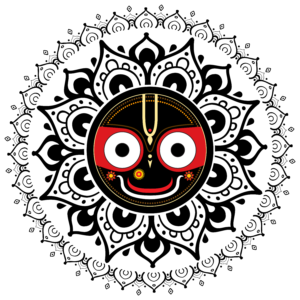
[ad_2]
#Gurudeva #institution #House #Bhakti






